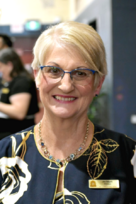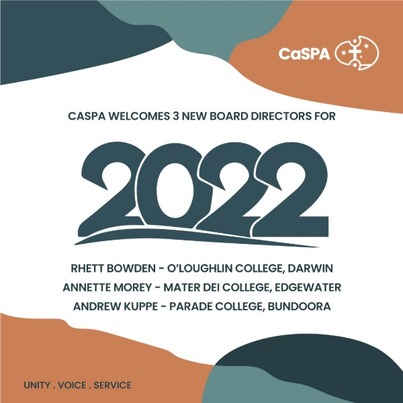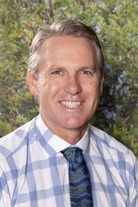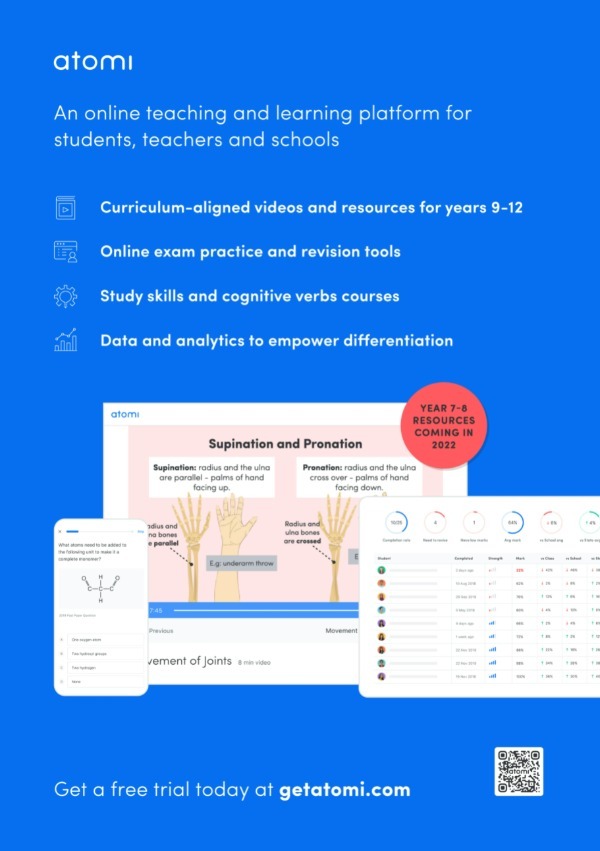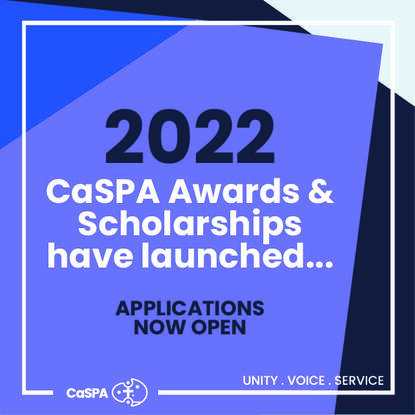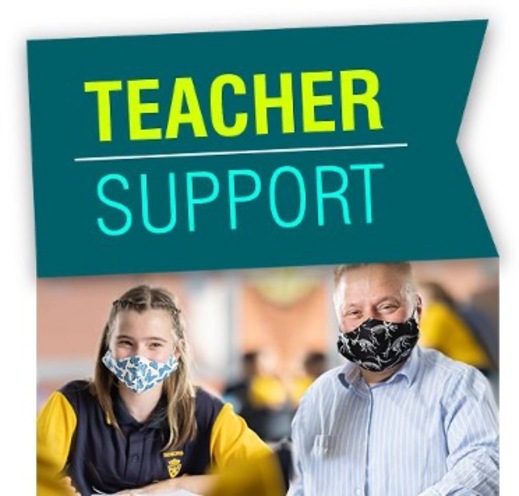March 2022 Newsletter
-
President's Message
-
New CaSPA Director Profiles
-
NGS Super - Platinum Partner
-
CaSPA Latest News
-
Leadership Article - 'Loud & Clear - ITE Review'
-
PSW - Platinum Partner
-
CaSPA Board Update
-
Woods Furniture - Platinum Partner
-
Article - 'Minister's Media Centre - ITE Review'
-
The School Photographer - Platinum Partner
-
Article - 'Catholic Education 2022: Challenges & Opportunities'
-
Atomi - Gold Partner
-
2022 CaSPA Awards & Scholarships - Applications
-
Rory's - Gold Partner
-
AITSL - Teacher Support
-
PRIME MINISTER'S Response to Refugee Letter 2021
-
FujiFilm - Silver Partner
-
2022 CaSPA National Conference
-
Education Horizons Group - Silver Partner
-
Caritas Resources
-
CCI - Silver Partner
-
INSTALLING THE SZAPP
Dear Colleagues
I hope the year is still going well for you and your community as restrictions continue to change and adapt.
In the last two weeks the CaSPA Board has met twice and made the decision to shift the 2022 CaSPA Conference to Canberra. My sincere thanks to Michael Lee (CaSPA Director) for taking on the challenge to organise the conference in a short timeframe. I am sure he will be well supported by his colleagues.
I hope our Principals and their leadership teams will take the opportunity to come to Canberra to enjoy collegiality after the last 2 and a half years of isolation.
A few weeks ago, I was delighted to receive a response from the Prime Minister regarding the letter CaSPA sent about concerns for Refugee students. CaSPA will continue to advocate and support Refugees and their children. The letter is included in this newsletter.
The CaSPA Board has involvement in other exciting initiatives with ACPPA, OFAI, Miriam Rose as well as the results of the 2021 PIVOT Survey. These are all listed in the CaSPA and Board Activities sections of this newsletter for your reference. I would particularly draw your attention to the OFAI development, which could be an amazing initiative for Australian education in the future.
In conclusion, I wish you well for the remainder of Term 1 and please keep your eye out for the CaSPA Conference registration details which will be coming soon.
God’s Blessing to all,
Ann Rebgetz
CaSPA President
Current School: Mater Dei College, Edgewater, WA
Previous Position: Principal, St Norbert College, Queens Park, WA
First Year as a Principal: 2012
Year of Birth: 1970
My big picture for my current school is: To be a school of choice as a contemporary, innovative educational experience in a faith based setting, where each student feels safe and a sense of belonging.
The Joy of Principalship is: Developing strong relationships within the College community and watching the development of our young people.
Favourite Book/s: The Book Thief, Cloud Street, the Michael Connolly series
Favourite Food: Italian and Japanese
Interests / Hobbies: Stand-up paddle boarding
My Favourite Well-Being Strategy: Yoga
Advice for a Beginning Principal: Lead by example and be authentic.
Favourite Leadership Quote: “If your actions inspire others to dream more, learn more, do more and become more, you are a leader.”
What Title would you give to your TED Talk or Book: Finding the humour: laugh daily.

Name: Andy Kuppe
Current School: Parade College
Previous Position: Deputy Principal
First Year as a Principal: 2018
Year of Birth: 1966
My big picture for my current school is: For staff and students to be innovative, just, inclusive, curious, kind and exceptional!
The Joy of Principalship is: Meeting a past student who has fulfilled his/her potential against the odds.
Favourite Book: The Happiest Man on Earth by Eddie Jaku
Favourite Food: Indian and Italian
Interests / Hobbies: Theatre, Golf (beginner), Family, Travel
My Favourite Well-Being Strategy: Good walk, good food and a sleep in.
Advice for a Beginning Principal: Be authentic, patient, courageous, collaborative, engage good mentors and always maintain a sense of humour.
Favourite Leadership Quote: Integrity, insight and inclusiveness are the three essential qualities of leadership - Sadhguru
What Title would you give to your TED Talk or Book: Oh, we’ve got a bigger dressing room than the puppets. That’s refreshing.Name: Rhett Bowden
Current School: O’Loughlin Catholic College
Previous Position: Head of Senior School, OCC
First Year as a Principal: 2017
Year of Birth: 1972
My big picture for my current school is: to continue to develop and grow as an excellent provider of the highest quality Catholic education to our community.
The Joy of Principalship is: being able to share in, and have an influence, albeit small, on the growth and development of students, staff and families.
Favourite Book: Trinity
Favourite Food: Watermelon
Interests / Hobbies: AFL, Swimming, Cricket, Crosswords
My Favourite Well-Being Strategy: Hanging out with my wife, Helen.
Advice for a Beginning Principal: Be yourself. Enjoy the challenges.
Favourite Leadership Quote: All we have to decide is what to do with the time that is given us.
What Title would you give to your TED Talk or Book: How did that happen?- Cluey Learning – has made an offer to provide online tutoring for small groups in response to COVID for students with learning needs. Cluey is a not-for-profit organisation and facilitated by qualified teachers. Information was sent to State and Territory associations for distribution late last year. https://clueylearning.com.au/
- CESF Meeting 28 February – Last meeting of the year with CSPA, ACPPA and NCEC. Key agenda items included staffing of Rural and Remote schools, staff recruitment and the effects of COVID around Australia.
- ITE Review Report from DESE – Distributed to State and Territory Associations. See Leadership Article in the newsletter.
- ACARA Stakeholders Meeting (February) – Update of NAPLAN data and the Australian Curriculum discussed.
- Canberra Conference Planning – The Canberra Principals have taken on the hosting of the 2022 CaSPA Conference. The program and promotional flyers are being developed in conjunction with the Evets company based in Canberra.
- OFAI Webinar - Participated in a DESE Webinar regarding the development of a new educational resource for Australian Schools - Online Formative Assessment Initiative
User Feature Validation Approach (https://ofai.edu.au/). PowerPoint was distributed to State and Territory associations.
'Loud and clear': major review finds ITE underprepares teachers for the classroom
By Sarah Duggan
Published February 24, 2022
Initial teacher education (ITE) providers should be required to publicly report the proportion of their academic staff who have recent teaching experience and have their performance tied to funding, a major federal review has proposed.
Released today, the Quality Initial Teacher Education Review’s final report outlines 17 recommendations that an expert panel say would attract more ‘highly suitable’ people to teaching and improve the quality of their preparation and entry into the profession.
The panel heard from 3000 people ‘interested’ in ITE to inform the recommendations.
Chaired by Lisa Paul AO PSM, former Secretary of the Department of Education, the panel received a ‘loud and clear’ message from teachers that many felt their ITE training failed to adequately prepare them for the practical aspects of the job.
Teachers felt underprepared in areas including phonemic awareness and phonics in reading instruction, classroom management, cultural responsiveness, supporting diverse learners and students with a disability, working with families and carers and teaching in regional settings, the review found.
“One way to ensure ITE students are classroom ready is to strengthen the link between practice and theory. If higher education providers prioritise recent practical experience for academic staff in ITE programs, there is an assurance that these programs will be guided by the most up-to-date teaching practices,” the report states.
Malcolm Elliott, president of the Australian Primary Principals Association and a member of the review panel, told EducationHQ that there was a “strong theme” in the findings around the need for stronger links between ITE and the teaching workforce.
“When we speak to school principals in particular, but experienced teachers more generally, one of the things that they say over and over again is that they just wish they had an opportunity to work more closely with the ITE candidates … and similarly feedback from the ITE graduates, who say 'Gee, if only I’d known a bit more about this, for example’...”
EducationHQ recently investigated the criticism cast at ITE providers. Current research and a building number of anecdotal accounts have suggested university staff hold an ideological bias towards inquiry-based learning approaches – a bias that critics argue diverts students away from evidence-based practices.
Greg Ashman, head of research at Ballarat Clarendon College in Victoria, told EducationHQ before the report was released that ITE currently focuses too little on the practical concerns of teaching.
“…Those who work in ITE typically do not currently teach. There are even some teacher trainers in Australia who have never taught. This leaves them vulnerable to ‘luxury beliefs’ – ideas that enhance their status with others who work in ITE but that are impractical to implement or hopelessly idealistic.”
He said many ITE practitioners pursue teaching approaches and research that are often deemed to be ‘superior’ from an ideological perspective.
“The basic problem is that the incentives of those who work in ITE are not aligned with the goal of ensuring graduate teachers are as effective as possible.
“In fact, many who work in ITE would be dismissive of the evidence about which teaching approaches are more effective than others, claiming that education is far too complicated to come to such reductive conclusions and labelling anyone attempting to do so as a ‘positivist’ – which makes you wonder what they think they are doing.”
Glenn Fahey, research fellow at libertarian think tank The Centre for Independent Studies, said he also saw an “ideological bias” among ITE staff.
“What we know is that by and large, education academics do weigh more heavily around the constructivist-inspired ideas…
“Academics have (now) got that driver’s seat in the teacher training experience. That’s why we’re seeing more of that constructivist and less of that instructivist approach coming through.”
The report said ITE providers should have clear funding incentives to offer evidence-based and ‘practical training’ to students.
“Performance by higher education providers should be made transparent amongst providers and then made public. Then, funding for ITE should be based on performance. Funding could also be tendered to higher education providers that meet quality criteria,” the report notes.
Funding incentives should also be handed to teacher employers – including school systems and schools – who uphold best practice, particularly with evidence-based approaches in reading instruction, the report said.
The panel also made a number of recommendations to better attract high quality and diverse candidates into teaching.
They found that if given the ‘right’ incentives, more high-achieving school graduates and mid-career professionals would consider taking up the profession.
Incentives include better pay, more recognition of prior learning in teacher training, and ‘innovative’ employment pathways into teaching, all of which should be looked into as a matter of urgency, the report urged.
“It was made crystal clear to the expert panel that a significant barrier to well-qualified mid-career professionals taking up teaching is the loss of earnings whilst studying teaching,” it noted.
“I’ve personally met a lot of people who have started teacher education in their mid-40s. And then gone on to 15 to 20-year careers in education, finishing off in their mid-60s, and have been just fantastic about it,” Elliott said.
The review suggested that for highly qualified candidates with strong subject knowledge, the Graduate Diploma might be enough preparation to teach in secondary schools.
“Teachers should be able to focus on teaching. The profession will be more attractive to new candidates if the burden of red tape is removed from teachers’ workloads…” the report added.
Professor Viv Ellis, Dean of the Faculty of Education at Monash University, said there was room for improvement in the report’s analysis.
“Unfortunately the report falls short when it comes to efforts to improve initial teacher education in schools.
"School placements – especially longer ones – provide the most powerful practical learning opportunities for student teachers. More attention must be paid to what happens in schools with ITE students.
"Any serious national effort to improve initial teacher education should address how schools can better influence how new teachers learn to teach,” Ellis said.
Elliott said he was hopeful for the future of the country's ITE.
“[This report is] a really, really fantastic step towards reinvigorating, acknowledging, building on continuously improving teacher education in Australia, and I think we've got some really exciting times ahead.
“A lot of work has been done, and there's more work to be done. I think initial teacher education really is on a good footing. But nevertheless, there's a lot of stuff that we can address.
“And obviously with 17 recommendations in the paper, there’s a bit to do, but it's exciting – really exciting.”
(Source: Education HQ.com)
CaSPA collaboration with ACPPA – The associations have met and are looking to work closely together into the future especially in the area of Principal Wellbeing. The Australian Catholic Principals Connect (ACP Connect) wellbeing website will be launched soon.
CaSPA Board Meeting (24 February) – CaSPA Conference matters were discussed at length. Meeting in May will now be held in Adelaide not Canberra.
The CaSPA Constitution - will be evaluated and updated by Russell / Kennedy Lawyers during 2022 to be in line with current legislative requirements.
Rebranding of CaSPA Website – Work has commenced on the redevelopment of the CaSPA Website.
PIVOT Survey – CaSPA’s Survey closed on 26 November. The response rate was very high. Many thanks to all the Principals who were able to participate. CaSPA has recently received the Survey results and will be releasing the findings in future newsletters and on the CaSPA website.
CaSPA Awards – Date extended to 31 March for nominations. Email sent to State and Territory associations
5 Survey Winners – All winners have received the books they chose.
Commissioned CaSPA Artwork – 2021 Senior Australian of the Year, Artist and former Principal in Daly Waters, Miriam Rose, has agreed to create a commissioned artwork for CaSPA. The artwork will be used as a part of CaSPA’s branding and be a support of Reconciliation and CaSPA’s acknowledgement of First Nations People.
We welcome our New Gold Business Partner Atomi - Atomi is an online teaching and learning platform for students, teachers and schools. Short, sharp videos, engaging lessons, and tiered assessments mapped to the curriculum support a host of instructional models and pedagogies.
Profiles of all the CaSPA Board are available on the CaSPA Website: https://caspa.schoolzineplus.com/current-and-past-board-members
MINISTERS' MEDIA CENTRE
Ministers of the Education, Skills and Employment Portfolio
Release type: Media Release
Date:24 February 2022
Professor Mark Scott to chair new Initial Teacher Education Quality
Assessment Expert Panel
Minister for Employment, Workforce, Skills, Small and Family Business
Acting Minister for Education and Youth
The Morrison Government has today announced Professor Mark Scott AO, Vice Chancellor of the University of Sydney and former Secretary of the NSW Education Department, will chair a new Initial Teacher Education Quality Assessment Expert Panel.
The Panel will develop new minimum and excellence threshold standards for Initial Teacher Education (ITE) courses. The Panel will also advise Government on the application of these thresholds to ITE funding to ensure delivery of quality ITE courses.
Today’s announcement comes as the Government releases the final report into quality teacher education. The Next Steps: Report of the Quality Initial Teacher Education (QITE) Review, which was chaired by Ms Lisa Paul AO PSM, makes 17 recommendations and provides a comprehensive examination of the issues facing initial teacher education (ITE) in Australia. The Review received more than 3,000 contributions from individuals and organisations across the education sector.
The report highlights three key areas to help new teachers be most effective:
- attracting high-quality, diverse candidates into initial teacher education,
- ensuring their preparation is evidence-based and practical; and
- inducting new teachers well.
The Morrison Government welcomed the QITE Review report and thanked the review panel.
Acting Minister for Education and Youth, Stuart Robert, said Australians expect a world-class school system for their children and the Morrison Government is committed to returning Australia to being one of the top education nations in the world.
‘We are incredibly fortunate to have passionate teachers transforming children’s lives every day, however the review has shown how we can continue to lift the quality of teaching in Australia by attracting the best and brightest to the teaching profession and preparing them to be effective teachers from day one,’ Minister Robert said.
‘The Commonwealth provides around $760 million to support the delivery of Initial Teacher Education in Australia and with this sizable investment, parents deserve the reassurance that people graduate from university or other tertiary institutions with the skills and knowledge they need to hit the ground running when they get into the classroom.’
The Government will undertake further work on mechanisms to strengthen the link between performance and funding of ITE courses, as recommended by the Review.
The Review found that not all providers were adequately equipping ITE students with the skills they need to be ready for the classroom upon graduation.
Professor Scott will work closely with initial teacher education schools across the country and other key stakeholders to identify the characteristics of excellence in teacher education, training and development and to advance an evidence-based approach to policy setting for the system.
The Government will make further announcements in response to other recommendations of the QITE Review in the coming weeks.
The QITE Review was Chaired by Ms Lisa Paul AO PSM (Secretary of the Commonwealth Department of Education 2004-2016), and the panel members comprised Emeritus Professor Bill Louden AM (former Deputy Vice-Chancellor and former Dean of Education at the University of WA), Mr Derek Scott (Principal of Haileybury School and 2019 Australian School Principal of the Year) and Mr Malcolm Elliott (President of the Australian Primary Principals Association).
The full report of the QITE Review is available at: https://www.dese.gov.au/quality-initial-teacher-education-review
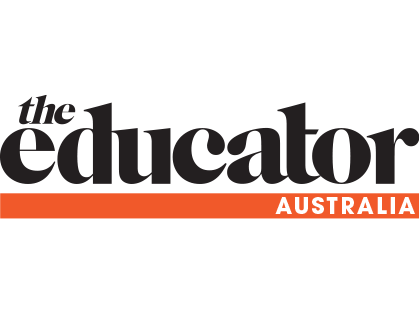
Catholic education in 2022: Challenges and opportunities
by Brett Henebery 14 Feb 2022
This year, more than 770,000 students are attending Catholic schools, and on the face of it, this figure is an impressive one, highlighting the sector as a trusted and popular institution for young people across Australia. But just like the public and private school systems,the Catholic school sector is faced with some increasingly complex challenges in the year ahead.
Serious staffing shortages, seismic education policy changes and worsening youth mental health and wellbeing issues in the wake of the COVID-19 pandemic are weighing heavily on the minds of the sector’s school leaders who are tasked with ensuring their staff and students bounce back from a heavily disruptive year and regain their focus and motivation in 2022.
Below, The Educator speaks to Catholic Secondary Principals Australia (CaSPA) president, Ann Rebgetz, about what kind of year 2022 will be for the health and wellbeing of the sector’s leaders, navigating duty of care in a Covid world, improving staff professional development and maintaining effective leadership.
TE: What kind of year is 2022 shaping up to be for the health and wellbeing of Australia’s Catholic secondary school principals?
Catholic Secondary Principals Australia believe 2022 is full of challenges for principals being in a context of hybrid learning models, Covid restrictions around school classes and events, amidst growing compliance requirements, the tightropes of legislation and interpretation, and student educational aspirations and attainments. Nonetheless, our recent survey data would show a high role satisfaction as would the data from the Professor Riley Well Being Survey. However, the data also shows the extensive hours worked by principals, so amidst this a good understanding of protective factors is imperative. As Catholic Secondary Principals an understanding of spirituality and general wellbeing is a constant reminder to all - this can also be challenging as the bridging of equity gaps is at the heart of our ethos.
TE: Duty of care is a crucial aspect of leading a school. Are there any serious challenges you foresee for Australian Catholic secondary schools navigating this important responsibility in 2022?
The greatest challenge will be to provide the best holistic education in a context where there is still uncertainty. As Covid has increased equity gaps, then the pathway to best learning outcomes has become more complex. There is a clouding with requirements in workplaces being more stringent, along with increased mental health issues associated with isolation. Students thrive on the building of confidence, and having opportunities to 'wet their feet' in the waters of experiences of learning. Our duty of care will be tested in ensuring we do this to the best of our ability.
TE: Have professional development priorities for Catholic secondary school staff changed since 2021?
Key PD priorities will vary from school to school, but will most likely incorporate online learning delivery modes. Other priorities will include understanding diverse needs and wellbeing, cultural learnings and competency, effective pedagogical practice with high impact, aligning of student outcomes with future oriented transferrable skills, innovative approaches with an emphasis on STEAM learning and competency.
TE: What will be the most pressing leadership priorities for Catholic secondary school principals in 2022?
A high ranked leadership priority will be ensuring there is strong leadership at the helm- this means investing in developing the leadership capital of the Senior Leadership Team of the School, and ensuring that all are leading strategically and as a team. Again, in being strategic, developing capacity of Middle Leaders and Teachers will have far reaching effects. The blueprint and vision of the school needs to be clear to facilitate all being on the one page. Commitment to the ethos and culture of the school inclusive of the faith of the community will provide impetus, collaboration and focus to achieve the local, national, and global goals for schools, taking into account their specific contexts. Understanding culturally diverse learners to create a more equitable society enabling potential to be maximized underpins all that we do. Leading well in resourcing is again crucial to outcomes.
2022 CaSPA Awards and Scholarships
The Scholarship applications closed on the 30th October. We will publish the successful applicant in due course.
The 2 Awards close on March 31st 2022 and we encourage you to apply by clicking on the below link.
CaSPA is very proud to announce the launching of the 2022 Scholarships and Awards.
Nomination Forms have been sent to all State and Territory Catholic Principal Associations and can be viewed at the following link on the CaSPA website: https://caspa.schoolzineplus.com/introduction
Please remember that all awardees to be eligible are expected to attend the 2022 Conference to receive their award in person.
Teacher Support – with you in 2022
The Australian Professional Standards for Teachers and the Australian Professional Standard for Principals guide you on how to progress through each career stage. AITSL supports you to meet the Standards by providing a broad range of evidence-based guides and tools, some of which we've curated for you here.
Project Compassion ‘For All Future Generations’ reminds us that the good we do today, will extend and impact the lives of generations to come. Register now for a live Caritas Q&A with your class and explore the variety of resources available. This year we are featuring stories from Mozambique, India, Australia, the Democratic Republic of Congo and the Solomon Islands.
Register a class for a live Caritas Q&A with Caritas staff and partners (30 mins)
Project Compassion School’s Guide
For all resources including teacher handbooks, student workbooks, PPTs, videos, interactive images, and prayer and reflection resources, visit lent.caritas.org.au
For support, email education@caritas.org.au

